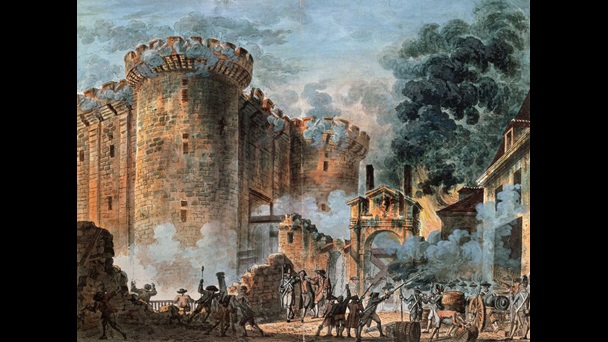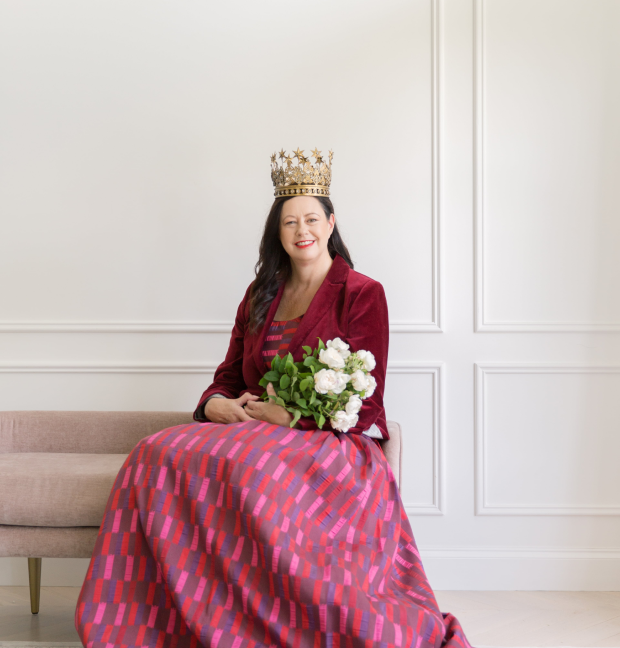
'Bastille Day' commemorates the famous Storming of the Bastille on 14 July 1789, a key turning point in the French Revolution. It is a day to celebrate freedom, democracy, and liberal ideas, usually by the eating of delicious French-inspired food & the drinking of much champagne.
The Bastille was a notorious fortress-prison in Paris where many people were confined without trial or hope of release, making it a symbol of the absolute power of the monarchy. At the time of the attack there were only seven prisoners in the prison, but the Bastille also held a large cache of ammunition and gunpowder which the Parisian mob needed in their struggle to overthrow the despotic feudal system.
Six weeks after the storming of the Bastille, the Declaration of the Rights of Man and of the Citizen was proclaimed – one of the key foundations tones of rights many of us now take for granted.
My novel The Blue Rose is set during those tumultuous years in France.
Here is how I describe the storming of the Bastille:
It was difficult to rest. The sky was lit up with a reddish glare. Throngs of people ran through the streets, looting shops, stealing sacks of grain and wheels of cheese and bottles of wine, brandishing stolen muskets and pistols. The duke had ordered all the doors barricaded with furniture, and shots fired over the heads of anyone who tried to break in. At dawn, every bell in the city was rung with a great clangour. Guns boomed. Drums rumbled. The streets were full of the clatter of running feet.
Yvette failed to bring Viviane her coffee and pain au chocolat for breakfast. Tying a wrapper over her nightgown, she went down to the servants’ quarters. There seemed fewer than usual. Yvette and Henri were hunched over the newspapers, their faces white and frightened. They looked up as Viviane came in, and rose to bow and curtsey, but she thought she saw hostility in their faces. She wanted to tell them that she was a duchess against her will, that she did not believe she was born better than any of them, but thought miserably no-one would believe her.
‘Pardon, madame,’ Henri said. ‘We did not know you were awake. Go back to bed, and Yvette will bring you something to eat.’
But when it came, her coffee was cold and bitter, and the bread was stale.
Looking out into the street from behind her shutter, Viviane saw that many of those marching in the streets were now wearing a cockade of red and blue ribbons, the medieval colours of Paris. They were laughing and singing and dragging cannons. Women and children as well as men, many with nothing more than a rolling-pin or broomstick as a weapon.
Viviane quickly unfastened the blue ribbon from her favourite shoes and fashioned it into a rosette. She dressed herself in her oldest gown, borrowed some sabots from Yvette’s room, and slipped out into the streets, the rosette pinned to her cap.
Viviane had to know what was happening. She could not bear to be confined within the duke’s palace any longer.
She knew it was stupid. The streets were dangerous, unpredictable.
Yet it was more like a festival than a riot. People were dancing along, arm-in-arm, waving wine bottles and slurring the words to old marching songs:
Three young drummers were coming back from war.
Three young drummers were coming back from war.
And ri, and ran, rap-at-ap-lan,
Were coming back from war.
‘We’re off to the Bastille!’ a woman shouted to Viviane. ‘To get us some gunpowder.’
‘We’re going to join the National Guard,’ another said, laughing.
‘Drink!’ another cried, shoving a bottle in her face. ‘To the Third Estate!’
Viviane drank obediently, and almost choked on the roughness of the wine.
‘Why are the cockades now blue and red?’ Viviane dared to ask, instinctively mimicking the woman’s Parisian accent. ‘Yesterday they were green.’
The woman spat on the ground. ‘Green is the colour of the Comte d’Artois, the king’s brother and our enemy. It was he who persuaded the king to sack Monsieur Necker! He plots with the queen to grind us down into the dirt. No, we are free Parisians! Red and blue are our colours.’
‘Red for blood,’ a wild-eyed woman slurred, ‘and blue for freedom!’
‘To the Bastille!’ someone shouted.
The shout was taken up by a hundred voices. ‘To the Bastille!’
They began to sing again. Viviane sang with them. Soon the crowd marched into the forecourt before the Bastille. It stood dark and silent, its drawbridge raised, cannon pointing their dark muzzles towards the crowd. Viviane felt a sudden qualm. She had better return, she thought, before anyone realised she was gone.
But one of the women slung a heavy arm across her shoulders. ‘Down with the Bastille!’ she screamed, took a long swig of wine, then passed the bottle to Viviane.
Viviane drank deeply, laughing a little as the women all began to sing again. She felt alive, as she had not done for months. She was like a starling in a vast swirling murmuration, moving as if with a single mind, the moment sharpened by the presence of the silently hovering hawk.
It was well after noon, and the sun beat down from a cloudless sky. Carts filled with burning straw and dung were drawn up near the gatehouse, to hide the movements of the attackers. As the heat intensified, so did the anger of the crowd. ‘Give us the Bastille!’ they screamed.
Some men had climbed onto the roof of a nearby shop, then scrambled onto the gatehouse. They sawed away at the chains holding up the drawbridge. Suddenly the chains snapped. The drawbridge crashed down. People trapped beneath screamed in pain, but the crowd surged forward, over the bridge and into the fortress.
A sudden loud explosion of cannon fire. Then the rumble of muskets.
‘They dare shoot at us?’ one of the women cried. ‘We’re unarmed!’
Caught up in the rage of the moment, she ran forward, brandishing her rolling-pin.
For a while, all was chaos. Smoke rolled across the courtyard, making Viviane cough. Then a great roar resounded.
A white handkerchief waved from one of the tower windows.
Moments later, a gate swung open. A man, his face contorted with rage, rushed forward and slashed with his sword at the guard opening the gate. The guard’s hand was chopped off. Blood sprayed out. With a howl, the hand was impaled on a pike and paraded high, still holding the heavy iron key.
Cold rushed over her. Viviane swayed. People hurried past. Pushing and shoving. Shouting and screaming. She groped her way free. Her stomach roiled. She reached a wall, leant against it, retched. When her stomach was empty, she wiped her mouth with the back of her hand and stumbled away.
Viviane remembered her father’s rapier, hissing down. David’s cry of pain. His maimed hand, running with blood. His severed finger, still encircled with gold.
Somehow she got herself back to the duke’s townhouse.
She had left the garden door unfastened. She crept through and locked it behind her, standing with her back pressed against it, her breast heaving. It was hard to catch a breath.
The mood of the crowd had changed so quickly. One moment Viviane had been singing with the other women, the next guns were firing and swords slashing.
No-one had noticed she was gone. Viviane made it safely to her room. She rang for hot water. When at last it came, she washed herself free of the smoke and the grime and splatters of blood. She dressed herself in her nightgown and crawled into bed.
But it was impossible to sleep.
Outside, the mob paraded the streets of Paris, the severed heads of the city mayor and the governor of the Bastille hoisted high on pikes.

